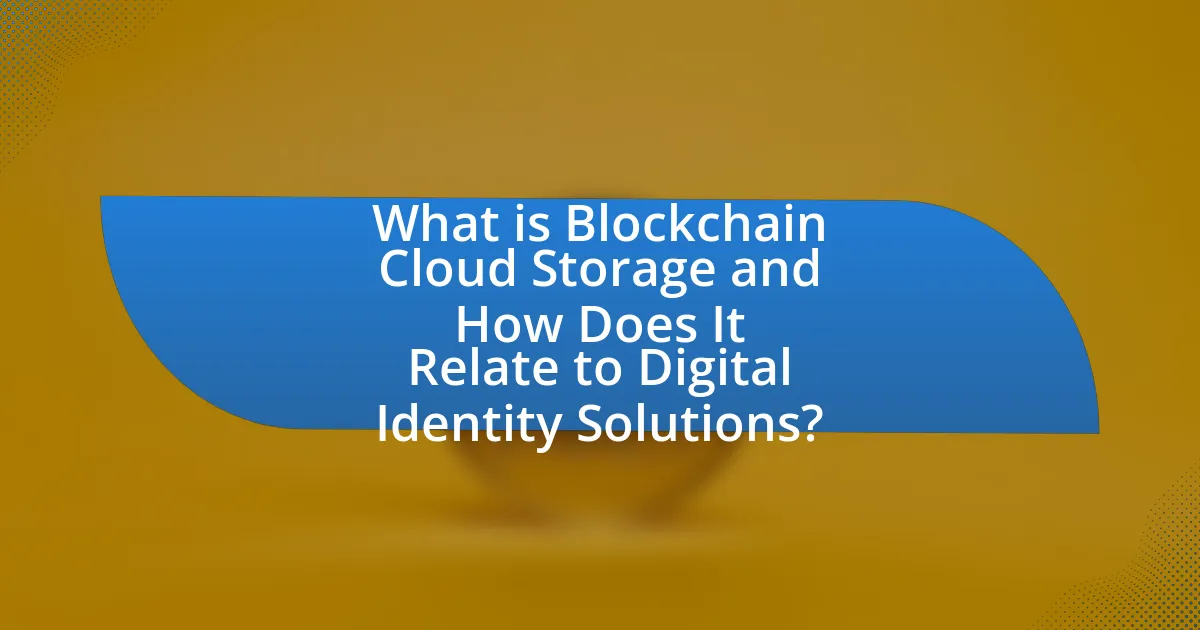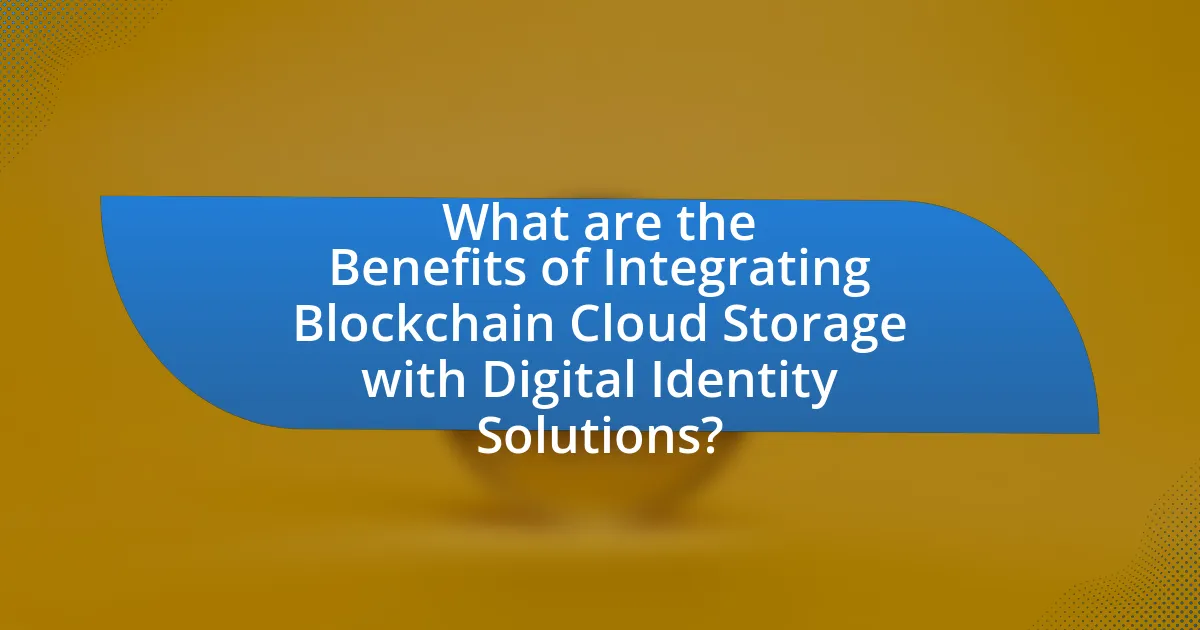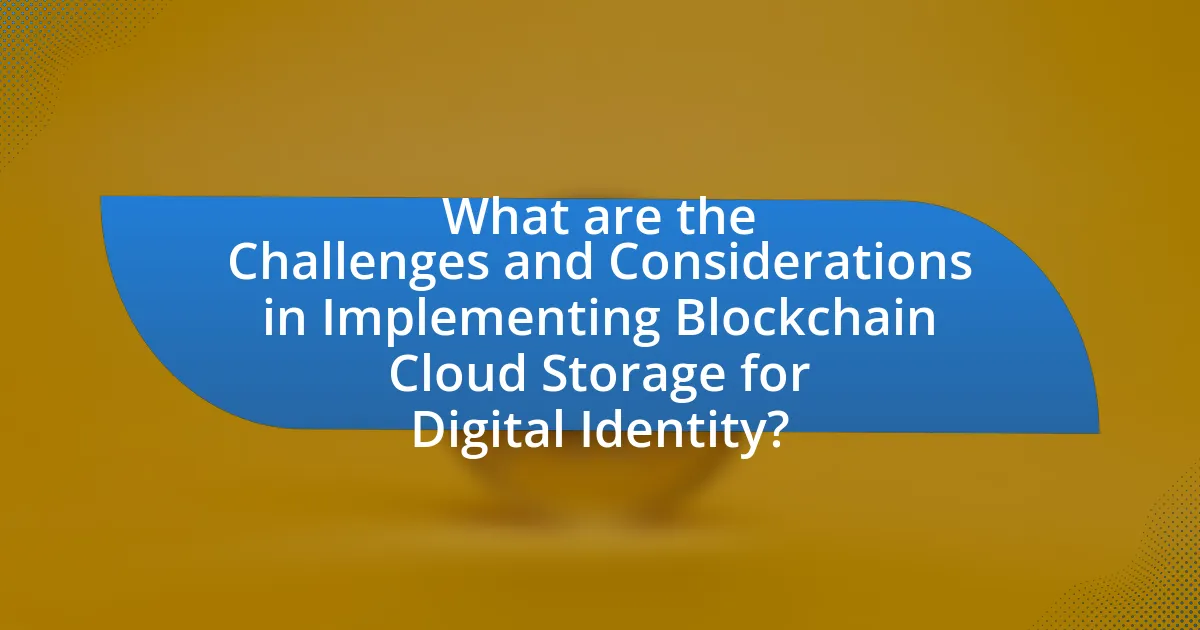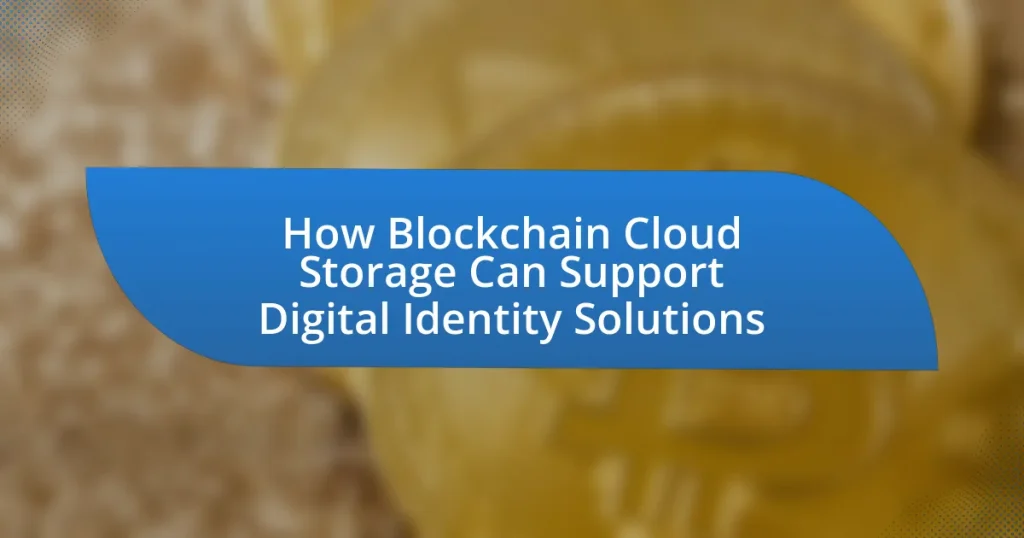Blockchain cloud storage is a decentralized data storage solution that leverages blockchain technology to securely manage data across a distributed network. This approach enhances digital identity solutions by providing a secure, tamper-proof method for storing identity-related information, allowing users to maintain control over their personal data. The article explores how blockchain cloud storage functions, its key features, and its implications for digital identity management, including the benefits of decentralization, enhanced security, and user control. Additionally, it addresses the challenges and considerations in implementing this technology, such as scalability, regulatory compliance, and user adoption, while outlining best practices for organizations to effectively leverage blockchain cloud storage in digital identity solutions.

What is Blockchain Cloud Storage and How Does It Relate to Digital Identity Solutions?
Blockchain cloud storage is a decentralized data storage solution that utilizes blockchain technology to securely store and manage data across a distributed network. This method enhances digital identity solutions by providing a secure, tamper-proof way to store identity-related information, ensuring that users maintain control over their personal data. The integration of blockchain in cloud storage allows for the creation of verifiable digital identities, as each transaction or data change is recorded on the blockchain, making it immutable and transparent. This relationship is supported by the fact that blockchain’s cryptographic features protect against unauthorized access and data breaches, which are critical concerns in digital identity management.
How does Blockchain Cloud Storage function?
Blockchain cloud storage functions by utilizing decentralized networks to store data across multiple nodes, ensuring data integrity and security. In this system, files are encrypted and split into smaller pieces, which are then distributed across various locations in the blockchain network. This decentralization prevents single points of failure and enhances data availability. Each piece of data is linked to a unique cryptographic hash, which verifies its authenticity and prevents unauthorized alterations. The use of smart contracts can automate data management processes, further enhancing efficiency and security. This method of storage not only protects against data breaches but also allows users to maintain control over their data, aligning with the principles of digital identity solutions.
What are the key features of Blockchain Cloud Storage?
The key features of Blockchain Cloud Storage include decentralization, enhanced security, data integrity, and transparency. Decentralization allows data to be stored across multiple nodes, reducing reliance on a single point of failure. Enhanced security is achieved through cryptographic techniques that protect data from unauthorized access and tampering. Data integrity is maintained as blockchain technology ensures that any changes to the data are recorded and verifiable, preventing data manipulation. Transparency is provided by the public ledger, which allows users to track data transactions and access history, fostering trust among users. These features collectively support the secure management of digital identities in various applications.
How does decentralization enhance data security in Blockchain Cloud Storage?
Decentralization enhances data security in Blockchain Cloud Storage by distributing data across multiple nodes rather than storing it in a single location. This distribution reduces the risk of data breaches, as compromising one node does not grant access to the entire dataset. Additionally, the use of cryptographic techniques ensures that data remains secure and tamper-proof, as each piece of data is encrypted and linked to a unique cryptographic hash. According to a study by the University of Cambridge, decentralized systems can reduce the likelihood of unauthorized access by up to 80% compared to centralized systems, demonstrating the effectiveness of decentralization in enhancing data security.
Why is Digital Identity important in today’s digital landscape?
Digital identity is crucial in today’s digital landscape because it enables secure and efficient online interactions. As individuals and organizations increasingly rely on digital platforms for transactions, communication, and services, a verified digital identity helps prevent fraud and identity theft. According to a report by the World Economic Forum, 1.1 billion people globally lack a formal identity, which limits their access to essential services. Furthermore, digital identity solutions enhance user experience by streamlining authentication processes, thereby fostering trust in digital ecosystems.
What challenges do traditional digital identity systems face?
Traditional digital identity systems face significant challenges, including security vulnerabilities, lack of user control, and issues with interoperability. Security vulnerabilities arise from centralized databases that are attractive targets for cyberattacks, leading to data breaches; for instance, the 2017 Equifax breach exposed sensitive information of approximately 147 million individuals. Lack of user control is evident as individuals often cannot manage their own data, relying instead on third-party providers who dictate terms of access and usage. Interoperability issues occur when different systems and platforms do not communicate effectively, hindering seamless identity verification across services. These challenges highlight the limitations of traditional systems and underscore the potential benefits of blockchain technology in enhancing security, user control, and interoperability in digital identity solutions.
How can Blockchain technology address these challenges?
Blockchain technology can address challenges in digital identity solutions by providing a decentralized and secure framework for identity verification. This technology enables individuals to control their personal data, reducing the risk of identity theft and fraud. For instance, blockchain’s immutable ledger ensures that once identity information is recorded, it cannot be altered or deleted without consensus, enhancing trust in the system. Additionally, smart contracts can automate verification processes, streamlining identity checks while maintaining privacy. According to a report by the World Economic Forum, blockchain can reduce identity fraud by up to 80%, demonstrating its effectiveness in enhancing security and reliability in digital identity management.
What role does Blockchain Cloud Storage play in Digital Identity Solutions?
Blockchain Cloud Storage plays a crucial role in Digital Identity Solutions by providing a secure and decentralized method for storing and managing identity data. This technology enhances data integrity and privacy, as it allows individuals to control their own identity information without relying on centralized authorities. For instance, blockchain’s immutable ledger ensures that once identity data is recorded, it cannot be altered or deleted, thereby reducing the risk of identity theft and fraud. Additionally, the use of cryptographic techniques in blockchain ensures that sensitive information is encrypted, further protecting user privacy. These features collectively empower users with greater ownership and security over their digital identities, making Blockchain Cloud Storage an essential component in the evolution of Digital Identity Solutions.
How does Blockchain Cloud Storage improve user control over personal data?
Blockchain Cloud Storage enhances user control over personal data by decentralizing data storage and providing users with cryptographic keys to manage access. This decentralization means that data is not stored on a single server, reducing the risk of unauthorized access and data breaches. Users retain ownership of their data through private keys, allowing them to grant or revoke access to specific individuals or applications at any time. Furthermore, the immutable nature of blockchain ensures that once data is recorded, it cannot be altered or deleted without user consent, thereby reinforcing data integrity and user autonomy.
What are the implications of using Blockchain for identity verification?
The implications of using Blockchain for identity verification include enhanced security, increased privacy, and improved efficiency. Blockchain technology provides a decentralized and immutable ledger, which significantly reduces the risk of identity theft and fraud by ensuring that identity data cannot be altered without consensus. According to a report by the World Economic Forum, blockchain can streamline identity verification processes, reducing costs and time associated with traditional methods. Furthermore, users maintain control over their personal information, allowing for selective sharing, which enhances privacy. These factors collectively contribute to a more secure and efficient identity verification system.

What are the Benefits of Integrating Blockchain Cloud Storage with Digital Identity Solutions?
Integrating blockchain cloud storage with digital identity solutions enhances security, privacy, and data integrity. Blockchain technology provides a decentralized and tamper-proof ledger, ensuring that identity data is securely stored and managed. This integration allows users to maintain control over their personal information, reducing the risk of identity theft and unauthorized access. Additionally, the use of smart contracts can automate identity verification processes, streamlining operations and improving user experience. According to a report by the World Economic Forum, blockchain can reduce identity fraud by up to 80%, highlighting its effectiveness in safeguarding digital identities.
How does this integration enhance security and privacy?
This integration enhances security and privacy by utilizing decentralized blockchain technology to store digital identities securely. Blockchain’s immutable ledger ensures that once data is recorded, it cannot be altered or deleted, which protects against unauthorized access and data tampering. Additionally, encryption techniques used in blockchain cloud storage safeguard sensitive information, making it accessible only to authorized users. According to a study by the International Journal of Information Management, blockchain can significantly reduce the risk of data breaches, as it decentralizes data storage, eliminating single points of failure that are common in traditional systems.
What encryption methods are utilized in Blockchain Cloud Storage for identity protection?
Blockchain Cloud Storage utilizes advanced encryption methods such as symmetric encryption, asymmetric encryption, and hashing for identity protection. Symmetric encryption, like AES (Advanced Encryption Standard), secures data with a single key, ensuring confidentiality. Asymmetric encryption, using public and private key pairs, facilitates secure data sharing and authentication. Hashing algorithms, such as SHA-256, create unique digital signatures for data integrity, preventing unauthorized alterations. These methods collectively enhance security by ensuring that only authorized users can access and modify identity-related information, thereby safeguarding digital identities in a decentralized environment.
How does user anonymity work in this context?
User anonymity in the context of blockchain cloud storage is achieved through cryptographic techniques that obscure user identities while allowing secure data transactions. Blockchain technology employs public and private key pairs, where users interact using their public keys, ensuring that their real identities remain hidden. This method allows for secure data storage and sharing without revealing personal information, as transactions are recorded on a decentralized ledger that does not link back to individual users. Additionally, protocols like zero-knowledge proofs enable users to verify information without disclosing their identity, further enhancing anonymity.
What advantages does Blockchain Cloud Storage offer for identity management?
Blockchain Cloud Storage offers enhanced security, decentralization, and transparency for identity management. By utilizing cryptographic techniques, it ensures that personal data is securely stored and only accessible to authorized users, significantly reducing the risk of data breaches. Decentralization eliminates single points of failure, making it harder for malicious actors to compromise identity information. Furthermore, the transparent nature of blockchain allows for verifiable transactions, enabling users to maintain control over their identities while providing proof of authenticity without revealing sensitive information. These features collectively enhance trust and reliability in identity management systems.
How does it facilitate seamless identity verification processes?
Blockchain cloud storage facilitates seamless identity verification processes by providing a decentralized and secure platform for storing and managing digital identities. This technology ensures that identity data is immutable and tamper-proof, which enhances trust among users and service providers. For instance, blockchain’s cryptographic techniques allow for secure sharing of identity information without the risk of data breaches, as seen in projects like SelfKey and Civic, which utilize blockchain to verify identities while maintaining user privacy. Additionally, the transparency of blockchain enables real-time verification, reducing the time and complexity associated with traditional identity verification methods.
What cost savings can organizations expect from adopting this technology?
Organizations can expect significant cost savings from adopting blockchain cloud storage technology, primarily through reduced data management expenses and enhanced operational efficiency. By utilizing decentralized storage, organizations can lower costs associated with traditional data centers, such as maintenance, hardware, and energy consumption. A study by Deloitte found that companies implementing blockchain solutions can reduce operational costs by up to 30% due to streamlined processes and minimized fraud risks. Additionally, the immutable nature of blockchain enhances data integrity, reducing the costs related to data breaches and compliance issues.

What are the Challenges and Considerations in Implementing Blockchain Cloud Storage for Digital Identity?
Implementing blockchain cloud storage for digital identity faces several challenges and considerations, including scalability, data privacy, regulatory compliance, and user adoption. Scalability issues arise because blockchain networks can struggle to handle large volumes of transactions efficiently, potentially leading to delays in data access. Data privacy is a concern as users may be hesitant to store sensitive personal information on a public ledger, even if encrypted. Regulatory compliance is critical, as different jurisdictions have varying laws regarding data protection and identity management, which can complicate implementation. Lastly, user adoption is a challenge, as individuals may be unfamiliar with blockchain technology and its benefits, requiring education and trust-building efforts to encourage widespread use.
What technical challenges must be addressed?
The technical challenges that must be addressed in the context of blockchain cloud storage supporting digital identity solutions include scalability, data privacy, and interoperability. Scalability issues arise from the need to handle a large volume of transactions efficiently, as blockchain networks can become congested, leading to slower processing times. Data privacy concerns are critical, as sensitive personal information must be securely stored and accessed without compromising user confidentiality. Interoperability challenges exist because different blockchain platforms may not communicate effectively, hindering seamless integration of digital identity solutions across various systems. Addressing these challenges is essential for the successful implementation of blockchain cloud storage in digital identity management.
How do scalability issues affect Blockchain Cloud Storage solutions?
Scalability issues significantly hinder Blockchain Cloud Storage solutions by limiting their ability to handle increasing amounts of data and user transactions efficiently. As the number of users and data volume grows, the performance of blockchain networks can degrade, leading to slower transaction speeds and higher costs. For instance, Ethereum, a widely used blockchain, has faced congestion issues during peak usage times, resulting in transaction delays and increased fees, which directly impacts the usability of cloud storage solutions built on such platforms. This limitation can deter businesses from adopting blockchain for cloud storage, as they require reliable and scalable solutions to manage digital identities effectively.
What are the interoperability concerns with existing systems?
Interoperability concerns with existing systems primarily involve the lack of standardized protocols and data formats, which hinder seamless communication between different platforms. Many legacy systems utilize proprietary technologies that do not easily integrate with newer solutions, leading to data silos and inefficiencies. For instance, a study by the National Institute of Standards and Technology highlights that over 70% of organizations face challenges in data sharing due to incompatible systems. Additionally, security and privacy issues arise when integrating disparate systems, as varying compliance standards can complicate data governance. These factors collectively impede the effective implementation of blockchain cloud storage solutions for digital identity management.
What regulatory and compliance issues should be considered?
Regulatory and compliance issues that should be considered in the context of blockchain cloud storage supporting digital identity solutions include data privacy laws, cybersecurity regulations, and identity verification standards. Data privacy laws, such as the General Data Protection Regulation (GDPR) in Europe, mandate strict guidelines on how personal data is collected, stored, and processed, impacting blockchain implementations. Cybersecurity regulations, like the Health Insurance Portability and Accountability Act (HIPAA) in the U.S., require safeguarding sensitive information, which blockchain must address to ensure compliance. Additionally, identity verification standards, such as those set by the National Institute of Standards and Technology (NIST), dictate how digital identities should be authenticated and managed, necessitating that blockchain solutions align with these frameworks to be legally viable.
How do data protection laws impact Blockchain Cloud Storage for identity solutions?
Data protection laws significantly influence Blockchain Cloud Storage for identity solutions by imposing strict regulations on data handling, storage, and user consent. These laws, such as the General Data Protection Regulation (GDPR) in Europe, require that personal data be processed lawfully, transparently, and for specific purposes, which directly affects how identity information is stored and managed on blockchain platforms. For instance, GDPR mandates that individuals have the right to access their data and request its deletion, challenging the immutable nature of blockchain technology. Compliance with these laws necessitates the development of mechanisms that allow for data erasure and user consent management, thereby shaping the architecture and operational protocols of blockchain cloud storage solutions.
What best practices should organizations follow to ensure compliance?
Organizations should implement a comprehensive compliance framework that includes regular audits, employee training, and adherence to relevant regulations. Regular audits help identify compliance gaps and ensure that policies are effectively enforced, while employee training fosters a culture of compliance and awareness of legal obligations. Adhering to regulations such as GDPR or HIPAA is crucial, as non-compliance can result in significant fines and reputational damage. According to a study by the Ponemon Institute, organizations that invest in compliance training can reduce the risk of data breaches by up to 50%.
What are the best practices for leveraging Blockchain Cloud Storage in Digital Identity Solutions?
The best practices for leveraging Blockchain Cloud Storage in Digital Identity Solutions include ensuring data integrity, enhancing security through encryption, and implementing decentralized identity management. Data integrity is maintained by utilizing blockchain’s immutable ledger, which records all transactions and changes, thus preventing unauthorized alterations. Security is enhanced by encrypting sensitive identity information before storing it on the blockchain, ensuring that only authorized users can access the data. Decentralized identity management allows users to control their own identity data, reducing reliance on centralized authorities and minimizing the risk of data breaches. These practices are supported by the inherent characteristics of blockchain technology, which provides transparency, security, and user empowerment in digital identity management.
How can organizations effectively implement Blockchain Cloud Storage for identity management?
Organizations can effectively implement Blockchain Cloud Storage for identity management by integrating decentralized storage solutions that enhance data security and user control. This involves utilizing blockchain technology to create immutable records of identity data, ensuring that individuals have ownership and control over their personal information. For instance, by employing smart contracts, organizations can automate identity verification processes while maintaining privacy and security. Research indicates that blockchain can reduce identity fraud by up to 80%, as it provides a transparent and tamper-proof system for managing identities. Additionally, organizations should focus on interoperability with existing systems to facilitate seamless integration and user adoption, thereby maximizing the benefits of blockchain cloud storage in identity management.
What strategies can enhance user adoption and trust in these solutions?
To enhance user adoption and trust in blockchain cloud storage solutions for digital identity, implementing user education and transparent communication is essential. User education involves providing clear, accessible information about how blockchain technology works, its benefits, and security features, which can demystify the technology and alleviate concerns. Transparent communication about data privacy policies, security measures, and how user data is managed fosters trust, as users feel informed and secure about their information. Additionally, integrating user feedback mechanisms allows for continuous improvement based on user experiences, further enhancing trust and adoption. Research indicates that organizations that prioritize user education and transparency see a significant increase in user engagement and trust levels, as evidenced by a study published in the Journal of Business Research, which found that informed users are 60% more likely to adopt new technologies.


